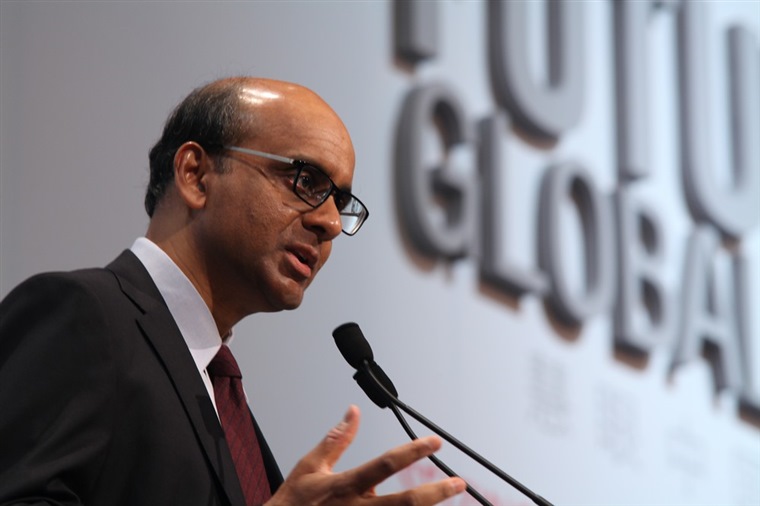Day 1
On 9 July 2012, Business China welcomed more than 400 senior business executives, government policy makers, top analysts and researchers, and global thought leaders to the FutureChina Global Forum (FCGF) 2012.
This year, to mark Business China’s fifth anniversary, the FCGF 2012 presented the strongest slate of more than 60 esteemed international speakers from various fields to helm the proceedings. Held for two consecutive days at Shangri-La Hotel, Singapore, the third edition of FCGF was themed “Seizing New Opportunities, Managing New Uncertainties”.
It is the only independent bilingual forum that provides an integrated picture of the ever-changing China from five orientations: politics and society, business and economy, science and technology, arts and culture, and global relations. Fresh perspectives were shared, thought-provoking ideas were exchanged and friendships forged throughout a total of nineteen planery, debate and round-table sessions.
Deputy Prime Minister and Minister for Finance Tharman Shanmugaratnam graced the opening ceremony and presented a keynote speech on the direction of China’s economy in the face of global slowdown and uncertainty. Accompanying DPM Tharman on the subsequent panel discussion, were Executive Director, President and CEO of China Merchants Bank, Dr Ma Weihua; Executive Vice-Chairman of China Institute of Innovation and Development Strategy, Ambassador Wu Jianmin; and Chairman of Hang Lung Properties Limited, Mr Ronnie Chan.
Welcoming the guests during the opening ceremony, Chairman of Business China, Mr Chua Thian Poh, said: “This independent bilingual platform gathers some of the world’s most eminent thought leaders, business experts and researchers right here in Singapore to share their insights on China’s evolving political, economic and societal landscape as well as its impact on the world.”
As a tribute to the resounding Singapore-China relations, a session themed “The Singapore-China connection: A privileged springboard” was organised. Speakers shared their experiences on how both International and Chinese enterprises have been leveraging on Singapore as an international springboard for multi-lateral trade and communications.
Besides Singapore-China relations, speakers and delegates also discussed how China’s upcoming leadership change would impact the country and its interactions with the world, and implications of China’s widening income gap. Hot-button topics such as the unprecedented uprising of social media in China, the awakening of civic movements, as well as environmental sustainability issues, were also explored.
The first day drew to a high note when Dr Lee Kai-Fu deliberated on the potential changes in China that can be brought about by IT entrepreneurs during the Dinner Dialogue. Dr Lee is the Chairman and CEO of Innovation Works, a business creating platform which is incubating China’s next generation of IT entrepreneurs. This was also the first speech made in Singapore by this former Founding President of Google China.
With an intensive 12 out of the 19 sessions covered in the first day, the FCGF2012 drew to a rewarding close with delegates and participants looking forward to more inspiring intellectual and social exchanges in the second day.
Day 2
10 July marked the second and final day of the FutureChina Global Forum 2012. Seven plenary sessions, including the highlight and finale for the event, a keynote lunch dialogue by Prime Minister Lee Hsien Loong, were held on this day.
In the highly anticipated session, PM Lee shared numerous strategic perspectives with the audience. He pointed out that every year, 13 million people move from rural China to the cities. This creates an enormous need for new job opportunities and various basic amenities required by the people. The potential of the Chinese domestic market is extremely vast. When moving into China, however, it is also important for Singapore firms to maintain the remarkable reputation of the Singapore brand name. “We must make sure that when we are there, we deliver, we maintain that brand name and don’t tarnish it,” PM Lee added.
The social impact of mainland Chinese migrants on Singapore society was another topic touched on by PM Lee. Even though both the China Chinese and Singaporean Chinese share the same ancestry roots, the markedly contrastive political and social environment in China and Singapore has led to significant dissimilarity between the two groups. There are differences in the mindset, behavior, attitude and general habits of the people. Nonetheless, as the world changes, Singapore must continue to adapt to the world. There is a need for Singapore to remain open to foreign talents. It is hence necessary to manage and contain the social detriments that follow the desirable economic benefits of having foreign talents.
The FutureChina Global Forum 2012 also held 6 other plenary sessions earlier in the day, touching on various pertinent issues including discussions on China’s “soft power”, China’s new breed of entrepreneurs, demographic issues, sustainability of economic growth and social systems in China, E-commerce market opportunities and social unrest in China. Each and every plenary session was well attended and well participated by the enthusiastic delegation. Many commented that the forum opened up avenues of discussion and exciting exchange of views, and updated their understanding of China.
“Because China is so complex, top executives need to understand its political, social, cultural and historical paradigms when trying to unravel its economics,” said CEO of Business China, Ms Low Yen Ling, in her closing speech for the Forum.
The world’s economic center of gravity may have shifted to the East but its impact along political and social parameters on rest of the world remains yet unknown. However, by the end of 10 July, the more than 400 delegates who attended the Forum walked away with invaluable insights on China issues, and deeper, more granular, “insider” knowledge from the unique mix of authoritative voices and business practitioners present at the Forum.

